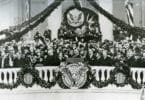Early Struggles and Self-Education
Lincoln’s early life was marked by poverty and hardship. His family moved frequently in search of better opportunities, and his mother, Nancy Hanks Lincoln, died when he was just nine years old. His father remarried, and Lincoln developed a close relationship with his stepmother, Sarah Bush Johnston, who encouraged his love of reading.
Lincoln had less than a year of formal education, but he was a voracious reader and taught himself much of what he knew. He borrowed books from neighbors and read everything he could get his hands on, including the Bible, Shakespeare, and classical literature. This self-education laid the foundation for his eloquence and intellectual depth.
Legal Career and Reputation
Before entering politics, Lincoln had a successful career as a lawyer. He was known for his integrity, fairness, and persuasive skills in the courtroom. Lincoln’s legal practice took him across Illinois, where he became known as “Honest Abe” for his ethical standards. One of his most famous cases was defending a man accused of murder, using an almanac to disprove a witness’s testimony about seeing the crime under a full moon.
Lincoln-Douglas Debates
The Lincoln-Douglas debates of 1858 were a series of seven debates between Lincoln and Senator Stephen A. Douglas during their campaign for the U.S. Senate seat from Illinois. These debates focused primarily on the issue of slavery and its expansion into the territories. Although Lincoln lost the Senate race, the debates catapulted him into the national spotlight and solidified his reputation as a formidable opponent of slavery.
Relationship with Mary Todd Lincoln
Lincoln’s marriage to Mary Todd was both a source of strength and challenge. Mary came from a prominent Kentucky family and was well-educated and politically savvy. However, she struggled with mental health issues and was often criticized for her spending habits and behavior. Despite these difficulties, their marriage was marked by deep affection and partnership. Mary supported Lincoln’s political career and shared his ambitions, even as they faced personal tragedies, including the loss of three of their four children.
Emancipation Proclamation and Its Impact
The Emancipation Proclamation, issued on January 1, 1863, was a strategic move by Lincoln to weaken the Confederacy and redefine the purpose of the Civil War. By declaring all slaves in Confederate-held territory free, Lincoln aimed to disrupt the South’s economy and add moral force to the Union cause. The proclamation also allowed for the enlistment of African American soldiers in the Union Army, further bolstering its ranks.
While the Emancipation Proclamation did not immediately free all slaves, it was a crucial step towards the abolition of slavery and set the stage for the Thirteenth Amendment, which permanently ended slavery in the United States.
Leadership During the Civil War
Lincoln’s leadership during the Civil War was marked by his ability to adapt and learn. He faced immense pressure from various factions, including Radical Republicans, who demanded more aggressive action against slavery, and Democrats, who opposed the war. Lincoln balanced these pressures while maintaining his focus on preserving the Union.
His military strategy evolved over time, and he demonstrated a willingness to replace generals who were not effective. Lincoln’s support for General Ulysses S. Grant and his appointment of William Tecumseh Sherman were pivotal in achieving Union victories.
The Gettysburg Address
The Gettysburg Address, delivered on November 19, 1863, is one of Lincoln’s most enduring legacies. In just a few minutes, Lincoln eloquently redefined the purpose of the war and emphasized the principles of equality and democracy. The address is considered a masterpiece of political oratory and continues to be studied and admired for its profound impact on American identity.
Plans for Reconstruction
Before his assassination, Lincoln began planning for the Reconstruction of the South. He advocated for a lenient approach to reintegrate the Southern states into the Union and heal the nation’s wounds. His “10 percent plan” proposed that a Southern state could be readmitted to the Union once 10 percent of its voters swore an oath of loyalty to the United States and accepted the end of slavery. Lincoln’s assassination, however, left the task of Reconstruction to his successor, Andrew Johnson, whose approach was more contentious and ultimately less effective.
Assassination and National Mourning
Lincoln’s assassination by John Wilkes Booth on April 14, 1865, was a tragic event that shocked the nation. His death came just days after the end of the Civil War, as the country began to look toward a hopeful future. The nation mourned deeply, and Lincoln’s funeral procession traveled through several states, allowing millions of Americans to pay their respects. His burial in Springfield, Illinois, marked the end of an era and the loss of one of America’s greatest leaders.
Legacy and Memorials
Lincoln’s legacy is honored in numerous ways across the United States. The Lincoln Memorial in Washington, D.C., dedicated in 1922, is one of the most iconic monuments, symbolizing his contributions to the nation and his enduring impact on American values. His image is featured on the U.S. penny and the five-dollar bill, reflecting his significance in American history.
Personal Traits and Leadership Style
Lincoln’s leadership style was characterized by his humility, empathy, and ability to communicate effectively. He was known for his storytelling, which he used to illustrate points and connect with others. His ability to remain calm under pressure and his willingness to listen to different perspectives were key to his success as a leader.
Conclusion
Abraham Lincoln’s life and presidency encompass a remarkable journey from humble beginnings to the highest office in the land. His leadership during one of the most challenging periods in American history, his commitment to justice and equality, and his vision for a united nation have left an indelible mark on the United States.
Lincoln’s legacy continues to inspire and guide future generations. His eloquence, moral clarity, and dedication to the principles of democracy and human rights serve as a timeless reminder of the enduring values that define America. As one of the most revered figures in history, Lincoln’s story is a testament to the power of perseverance, integrity, and leadership in the face of adversity.
Recommended Books on Abraham Lincoln
“Team of Rivals: The Political Genius of Abraham Lincoln” by Doris Kearns Goodwin
This award-winning book examines Lincoln’s leadership and ability to unite a cabinet of rivals to steer the nation through the Civil War.
“Lincoln” by David Herbert Donald
A comprehensive and highly acclaimed biography of Abraham Lincoln that provides deep insights into his life, presidency, and enduring legacy.
“A. Lincoln: A Biography” by Ronald C. White Jr.
This biography offers a thorough and engaging narrative of Lincoln’s life, highlighting his personal and political struggles and triumphs.
“Lincoln at Gettysburg: The Words that Remade America” by Garry Wills
This book analyzes Lincoln’s Gettysburg Address and its profound impact on American identity and values.
“The Fiery Trial: Abraham Lincoln and American Slavery” by Eric Foner
Eric Foner’s Pulitzer Prize-winning book examines Lincoln’s evolving views on slavery and his role in the abolition movement.






